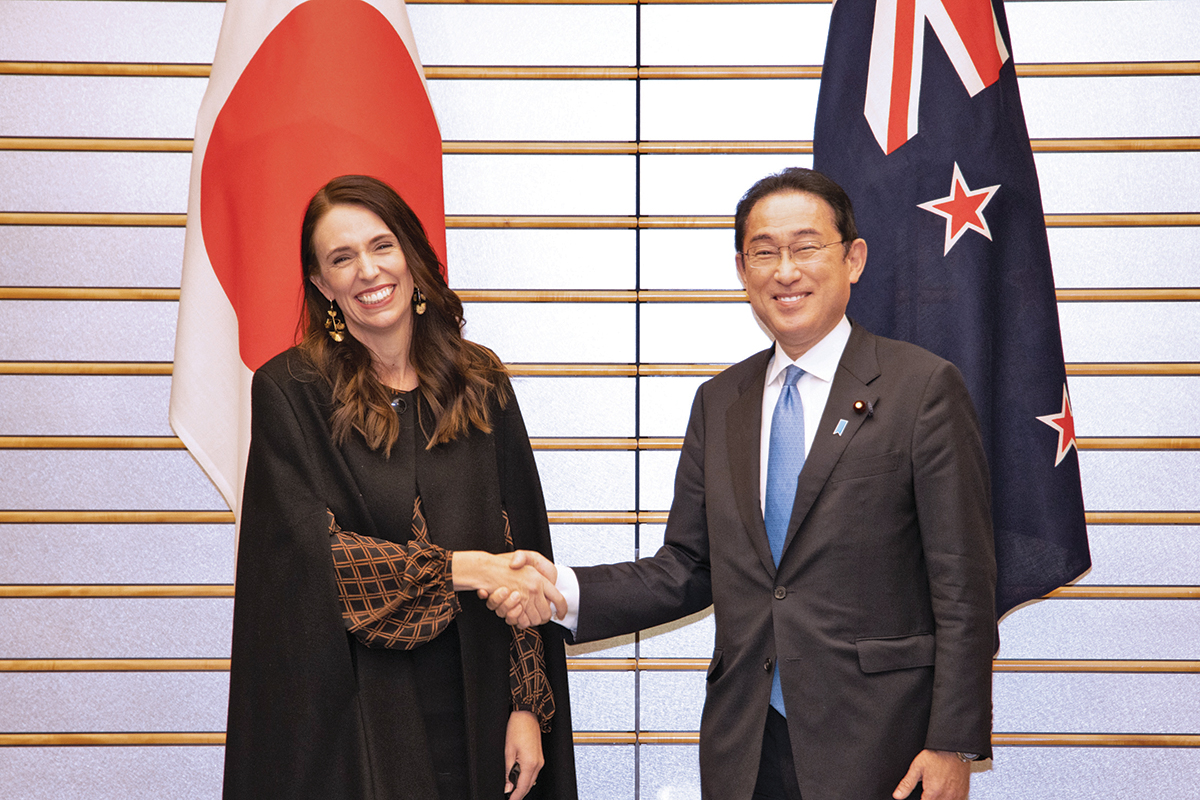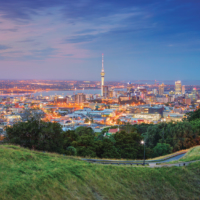The bilateral diplomatic relationship between Japan and New Zealand commenced on April 28, 1952, with the entering into force of the San Francisco Peace Treaty. The New Zealand Embassy in Japan was New Zealand’s first diplomatic mission in Asia, and was closely followed by the establishment of the Japanese Embassy in New Zealand.
What does the year 2022 represent in the seven-decade Japan-New Zealand relationship?
Prime Minister Jacinda Ardern: “This year marks the 70th anniversary of our diplomatic relations. We have so much to celebrate together. Over seven decades we have built an incredibly successful, close and resilient relationship. Literally millions of Japanese people and New Zealanders have visited, studied in and worked in each other’s countries.”

New Zealand Ambassador to Japan Hamish Cooper: “For seven decades, New Zealand and Japan have worked together as partners who share common democratic values and a commitment to support the international rules-based system.
“New Zealand Prime Minister Jacinda Ardern and her Japanese counterpart Prime Minister (Fumio) Kishida commemorated the anniversary in April in Tokyo, reflecting on the past and looking ahead to future opportunities to collaborate.”
How important are the trade and economic relations between Japan and New Zealand?
Ardern: “Our trade relationship is worth around 8 billion New Zealand dollars annually, making Japan New Zealand’s fourth-largest trading partner. Prior to the pandemic, Japan was New Zealand’s second-largest Asian visitor market and third-largest source of students.”
Minister for Trade and Export Growth Damien O’Connor: “New Zealand’s well-being is inextricably tied to the Indo-Pacific, which we see as our wider home region. We have benefitted from the stability and economic growth that the rules-based order, regional organizations and economic integration have provided in the region.
“In particular we will keep working with Japan to shape regional economic architecture through CPTPP (the Comprehensive and Progressive Agreement for Trans-Pacific Partnership), APEC (Asia-Pacific Economic Cooperation) and RCEP (the Regional Comprehensive Economic Partnership). Japan was a key partner for us last year when we hosted APEC, and worked to support regional supply chains and free trade in essential goods and medicines.
“I want to reaffirm that my government values and welcomes Japanese investment in New Zealand. Japanese companies have a strong track record of investing for the long term, empowering local communities, making products more valuable and providing New Zealand exporters with global connections. These factors make Japan a special and valuable economic partner for New Zealand. And as an open market with a regulatory environment that supports innovation, New Zealand is an ideal home for Japanese technology, investment and research.”

Trade Commissioner Craig Pettigrew: “The enormous supply chain and logistics challenges which many of our traders have faced must be acknowledged. But it is gratifying to note that the most recent trade statistics suggest that goods exports from New Zealand to Japan during the first four months of 2022 increased by 33%, compared to the same period last year. Likewise, Japan’s goods exports to New Zealand are off to a positive start this year, with a 28% increase during the first quarter, year on year.
“New Zealand and Japan share an intense focus in high-quality food standards. That has been a firm foundation for building complementary seasonal horticulture partnerships. For example, New Zealand’s Zespri is licensing and supporting Japanese growers to produce kiwifruit counterseasonally to improve year-round supply; and Budou Senshin is growing premium Japanese varieties of table grapes in Hawke’s Bay to provide counterseasonal supply to Japan and other Asian markets.”
What are the positions of both countries with regard to climate change and renewable energy?
Cooper: “New Zealand and Japan are working together to help meet our respective goals of net carbon neutrality by 2050. Obayashi Corp. and Mitsui & Co. are both working with New Zealand companies on green hydrogen projects in New Zealand. In the geothermal energy sector, New Zealand’s below-surface engineering capabilities directly complement Japan’s above-ground engineering, and together we can significantly increase supply of this renewable energy.”
What are your perspectives on people-to-people exchanges, tourism, education and cultural relations between the two Pacific countries?
Education New Zealand’s General Manager – International Lisa Futschek: “Education has played a vital role in our bilateral linkages over many decades, fostering people-to-people ties and reinforcing shared values between our two countries.
“Before the pandemic, more than 10,000 students from Japan studied in New Zealand every year, making an important economic contribution, but also enriching our schools and communities, and helping New Zealand students become more globally connected.
“New Zealand offers overseas international students a unique, high-quality education experience in a welcoming environment. We truly care for the students who choose a New Zealand education and we want to ensure everyone feels respected, thought of, nurtured and safe.”
Tourism New Zealand’s General Manager Asia Gregg Wafelbakker: “There’s so much to discover around every corner in Aotearoa, with each region and season offering travelers a unique perspective of New Zealand. Traditionally Japanese visitors have loved coming to New Zealand to experience our wonderful nature and World Heritage sites, as well as our spectacular night sky in the South Island. I think there is still plenty to be discovered though and more and more we are seeing Japanese visitors wanting to get off the beaten track and seek out their own unique experiences, which is great to see. In particular I would encourage Japanese visitors to explore our cities and check out our cafes and restaurants.”







